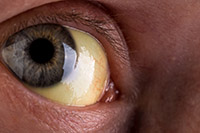THE LIVER is the largest internal organ in our body.
It performs several functions, such as:
- Processing consumed food and drinks
- Detoxifying harmful substances in the blood before it is circulated back to the rest of the body
- Regulating body metabolism
- Storing vitamins and minerals
- Synthesizing protein
- Producing bile.
Hepatitis refers to the inflammation of the liver which is usually caused by drug abuse, medications, immune disorders and viral hepatitis.
Viral hepatitis is caused by viruses which specifically attack the liver tissue, resulting in subsequent damage to the organ.
Common causes of liver disease include viral hepatitis attacks, fatty liver disease, liver cancer and liver cirrhosis.
5 Types Of Hepatitis
Viral hepatitis can be classified into two categories, acute hepatitis and chronic hepatitis.
Acute hepatitis is commonly caused by hepatitis A, B, C, D and E viruses. Chronic hepatitis is caused by the hepatitis B and C viruses.
- Hepatitis A
Hepatitis A is usually transmitted by having close contact with an infected person and through food or water that is contaminated by the infected person. Seafood and raw shellfish that are gathered from the sewage can also cause one to get infected by hepatitis A.
- Hepatitis B
Hepatitis B virus is the most common strain in Singapore.
According to SingHealth, 6% of the Singapore population are hepatitis B carriers.
Complications of hepatitis B, especially in chronic cases, include liver cirrhosis, bleeding from stomach varices, liver and kidney failure, liver cancer, and even early death.
- Hepatitis C
Hepatitis C virus can be transmitted through contact with the blood or body fluids of an infected person. There are usually no signs or symptoms at the early stages. Signs and symptoms become more prominent when liver damage has already occurred.
- Hepatitis D
Hepatitis D occurs in people who are already infected with the hepatitis B virus. The symptoms experienced by people infected by hepatitis D are more severe than people infected by hepatitis B.
- Hepatitis E
Hepatitis E is similar to hepatitis A. It spreads whn people come in contact with contaminated water and food. This condition is more prevalent in people who stay in unhygienic living conditions.
You Might Also Like To Read:
The Treatment Of Ankle Sprains
The Good And Bad Of Cholesterol

Hepatitis B – The Silent Killer
Most chronic hepatitis B carriers are unaware of their condition and may even feel normal as the condition of hepatitis B displays no symptoms at the early stages until it is too late. Some signs to look out for include:
- Yellowing of the skin and eyes (Jaundice)
- Joint pain

- Rash (itchy or non-itchy)
- Persistent fever
- Severe lethargy
- Upper abdominal pain
- Dark, tea-coloured urine
- Loss of appetit
- Nausea and vomiting.
Preventative Measures
It is important for hepatitis carriers and people around them to be aware of the type of contact that they make with each other or with others. They must also be wary about the ways to limit the spread of the hepatitis virus. This would include:
- Avoid sharing personal items such as razors, shavers, toothbrushes, earrings or other instruments that may result in skin tears or wounds
- Go for a screening test before donating blood
- Ensure that sterile needles are used for acupuncture, tattoos, ears and other forms of body piercings
- Refrain from direct contact with blood or any bodily fluids from hepatitis carriers, especially when there is an open wound.
“Hepatitis B virus is not transmissible through the sharing of utensils, contact sport and peer-to-peer social interaction, explains Dr Chong Jia An, General Practitioner from Healthway Medical Group.
“However, it is important to educate family and friends if you are a hepatitis carrier as this would help to minimise the spread of the virus.”
Vaccination is the best way to prevent Hepatitis B infection.
People who are at higher risks of contracting hepatitis B include healthcare providers, pregnant women, people who are living in close household contact with an infected person, kidney dialysis patients and individuals who are sexually active.
The Healthy Way is a regular health series developed for STORM.SG by Healthway Medical. If you have specific queries, please do email us at health@storm.sg and we will ask the panel of experts for their advice. Do note that only selected queries will be addressed.

Living With A Hepatitis B Carrier
If you have a family member or close friend whom you are living with that is a carrier of the hepatitis B virus, you may refer to the following suggestions or consult your doctor for more information:
- Do not share food that has been in the carrier’s mouth
- Be aware of lifestyle and dietary habits
- Always wash your hands with soap or disinfectant after any contact with the carrier
- Go for medical check-ups every six months to one year
- Go for hepatitis vaccination for prevention
Treating Hepatitis B
Treatment for hepatitis B carriers is usually a long-term process from the time of diagnosis. For patients who develop symptoms in the acute phase, medication is usually given to ease the symptoms until they recover. For carriers who have chronic infection, the treatment depends on how active the disease is. For more information on treatment of chronic hepatitis infection, please contact your doctor immediately.

Dr Chong Jia An is a general practitioner with Healthway Medical Group. He completed his medical undergraduate studies in 2013 at National University of Singapore. He is currently furthering his medical education in Family Medicine with the College of Family Medicine Singapore.
Images: Shutterstock























